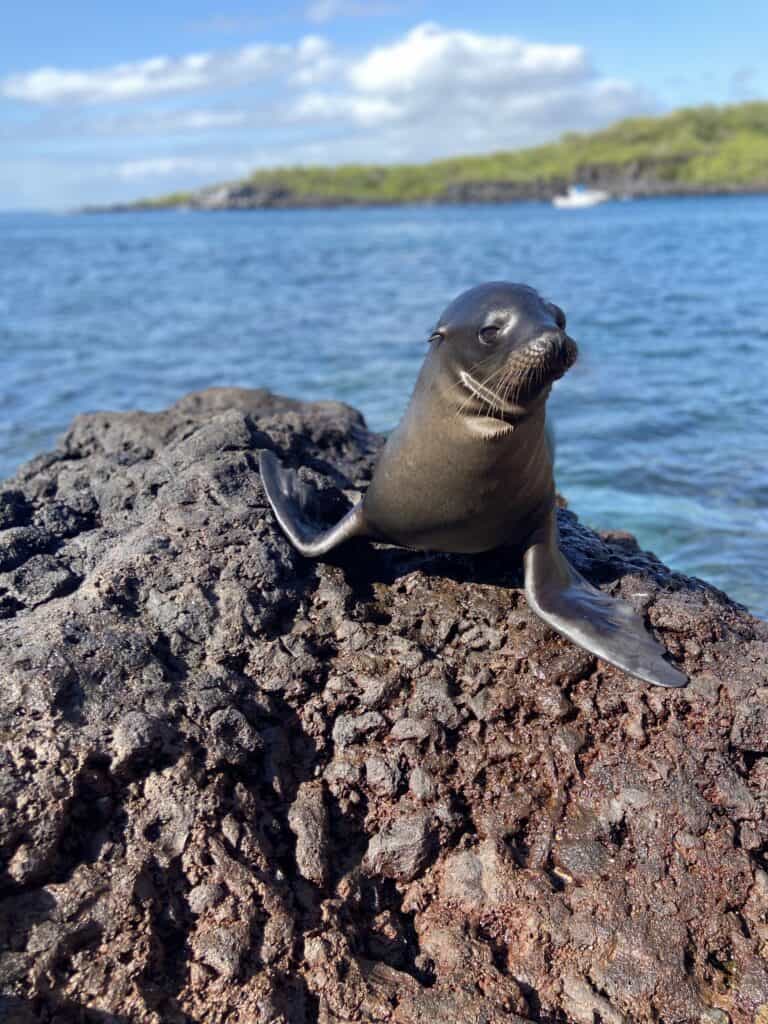Researchers have developed a DNA test to better detect the parasites in blood samples
Free-ranging dogs are likely passing on heartworm to endangered sea lions in the Galapagos Islands.
The discovery of these parasites in several Galapagos sea lions—the first time these worms have been reported in this host—has implications for the management of unique and endemic wildlife in the South American archipelago.
“They are a conservation priority and a keystone species,” said Isabella Livingston, a PhD candidate in genetics and genomics at North Carolina State University, about the marine mammals.
Livingston’s school has been collaborating with the Galapagos National Park for years—students in the university’s veterinary program go down there every year to work with wildlife. During one such trip, some veterinarians had noticed that several Galapagos sea lions (Zalophus wollebaeki) suffered from a “really nasty cough,” Livingston said.

In research Livingston presented at the 2024 TWS Conference in Baltimore, Maryland, she and her colleagues ran tests for illnesses like SARS-CoV-2, the disease that causes COVID-19 in humans. On a whim, they also ran SNAP tests—a common test usually used to detect heartworm (Dirofilaria immitis) in dogs—on the blood of 28 Galapagos sea lions.
Two of these tests came back positive for heartworm.
This parasitic nematode specializes on dogs but can also affect other mammals and even humans at times. Mosquitos transmit the parasite to new hosts, where it can cause cardiopulmonary dirofilariasis, a condition that leads to breathing problems and eventually heart problems if left untreated. In their larval stage, these worms typically infect the tissue of mammals before migrating to the heart and lungs as they mature. The worms reduce blood flow in animals and can cause death.

After Livingston reported her findings to experts in the Galapagos, another case of likely heartworm surfaced in a sea lion killed by a shark on the island. Necropsies of the sea lion revealed worms in its heart, and Livingston and her colleagues confirmed them in a molecular test.
DNA tests confirm heartworm
The problem lies in the fact that SNAP tests, originally designed to identify the parasite in dogs, may not be as precise in other species. SNAP tests are also designed to detect adult female worms, so these tests could miss heartworm cases in an early stage of infection. They could also miss infection by male worms, since only antigens produced by females show up on tests. Livingston and her colleagues developed a more accurate test using genetic analysis for heartworm detection that can also identify the roundworm species rather than just a general infection. They published their results in a study in 2024 in Ecology and Evolution.
They ran tests on the same 28 individuals and discovered that three sea lions carried roundworms. They detected the parasite in the blood of only one of the two sea lions that tested positive in the SNAP test—Livingston said SNAP tests are known for sometimes providing false positives. The other two were not detected by SNAP tests, and one of these wasn’t heartworm itself but a related roundworm, Dirofilaria repens. The team didn’t run any tests on the sea lion that succumbed to a shark attack.
All of the 20 individuals they tested were juveniles, including the three that tested positive. This is surprising, Livingston said. “This disease takes a while to develop through their life cycle, so you wouldn’t exactly expect it in juveniles.”
It’s unclear how heartworm may be affecting sea lions. But Livingston speculated that the shark’s attack on the one individual might have resulted in a weakened state that made it harder for the sea lion to escape the predator. In other words, heartworm may be leading to death indirectly, even if not directly.
How are Galapagos sea lions getting heartworm?
These infections are concerning since the International Union for Conservation of Nature considers Galapagos sea lions endangered, mostly due to sensitivity to increased environmental fluctuations caused by climate change and the impact of introduced species like dogs.

The marine mammals are likely contracting heartworm from mosquitos that recently bit free-ranging dogs, which are plentiful on the four islands inhabited by people in the Galapagos Archipelago. Livingston said that no regulations prohibit free-ranging dogs on the islands. These canines—some of which are free-ranging pets and some of which are strays—sometimes compete for territory with sea lions. They are also known to transmit other diseases to sea lions like, canine distemper and mycoplasmas—another respiratory disease.
“We do know that they are spreading disease to these Galapagos sea lions, but heartworm had never been documented before,” Livingston said.
She hopes that this study will help bring more attention to the problems that dogs cause for native endemic species in the Galapagos, whose economy is largely sustained by ecotourism. “I hope the molecular tools we developed will allow Galapagos managers to continue surveillance of the parasite and prevent it from becoming a significant problem,” Livingston said.
As for the DNA test she developed, it can be used on the blood of multiple species—not just that of sea lions—to detect heartworm and related nematodes.






